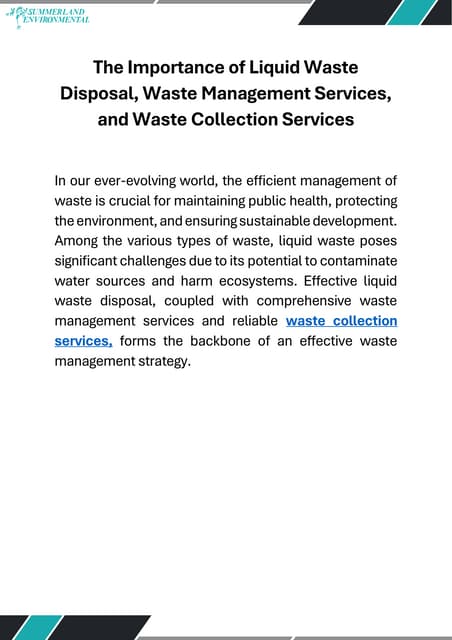Reclaim Waste Fundamentals Explained
The Main Principles Of Reclaim Waste
Table of ContentsThe Best Guide To Reclaim WasteThe Definitive Guide to Reclaim Waste3 Easy Facts About Reclaim Waste DescribedThe Single Strategy To Use For Reclaim WasteThe 7-Minute Rule for Reclaim Waste
Check out the types, events, and forms of fluid waste. Residential sewer waste refers to the waste and items from a household septic system. This sort of waste is produced by humans in homes, colleges, and various other structures. This only consists of septic systems that have a drain area. The correct management and disposal of domestic sewer waste need liquid waste to be transferred to a sewer treatment plant where the proper techniques and equipment are put on detoxify and dispose of waste.
Business waste typically includes possible threats, such as combustible products or a mix of liquid and strong waste products, and calls for a more advanced and thorough disposal procedure. The disposal of business waste normally entails the filtering of waste before transportation to ensure safe and appropriate disposal. Hazardous waste is created from by-products and drainage of commercial procedures and manufacturing.
This kind of waste can not make use of the exact same sewage management transport or processes as septic or business fluids. The hazardous waste management process needs the evaluation and screening of liquid waste before it undergoes the disposal process (industrial wastewater treatment). Drainage waste is the liquid waste that originates from runoff and excess stormwater in highly populated locations or cities
Drainage waste can create contamination and flooding if not managed effectively. Making sure correct waste administration can prevent calamities and decrease ecological injury.
Top Guidelines Of Reclaim Waste
Contact PROS Services today to discover our waste management and disposal solutions and the appropriate means to look after the liquid waste you generate.
(https://leonaube33101.wixsite.com/reclaim-waste/post/effective-liquid-waste-removal-and-disposal-everything-you-need-to-know)Do you understand what occurs to your water when you draw the plug, flush the bathroom or drain the washing maker? No? Well, it's worth understanding. This supposed 'wastewater' is not just an essential source yet, after therapy, will certainly be released to our land, rivers or the ocean. Used water from commodes, showers, baths, kitchen sinks, washings and commercial processes is called wastewater.

water used to cool down machinery or tidy plant and devices). Stormwater, a type of wastewater, is overflow that flows from agricultural and city areas such as roofing systems, parks, gardens, roadways, courses and seamless gutters right into stormwater drains pipes, after rainfall. Stormwater moves unattended straight to neighborhood creeks or rivers, eventually reaching the sea.
Get This Report about Reclaim Waste
In Queensland, many wastewater is dealt with at sewer treatment plants. Wastewater is transferred from residential or industrial websites click over here via a system of sewers and pump stations, recognized as sewage reticulation, to a sewage treatment plant. Neighborhood governments construct, maintain and run most sewage treatment plants. Operators are certified under the Environmental Management Act 1994 to discharge cured wastewater at an acceptable environmental standard into waterways.
The Department of Natural Resources advises city governments about managing, operating and preserving sewage systems and treatment plants. In unsewered areas, city governments may need homeowners to mount specific or house sewage treatment systems to treat residential wastewater from commodes, kitchens, bathrooms and washings. The Department of Natural Resources authorises the usage of household systems when they are confirmed to be reliable.
A lot of stormwater receives no treatment. In some brand-new communities, therapy of some stormwater to get rid of trash, sand and gravel has begun making use of gross contaminant traps. Wastewater therapy happens in four phases: Eliminates solid issue. Larger solids, such as plastics and various other things mistakenly discharged to drains, are eliminated when wastewater is travelled through screens.
Wastewater then flows right into large storage tanks where solids work out and are eliminated as sludge. Oil and residue are skimmed from the surface area. Uses tiny living organisms understands as micro-organisms to break down and get rid of continuing to be liquified wastes and great fragments. Micro-organisms and wastes are integrated in the sludge. Removes nitrogen and phosphorus nutrients that can cause algal blossoms in our rivers and endanger water life.
What Does Reclaim Waste Do?
Nutrient elimination is not offered in any way sewage treatment plants due to the fact that it calls for costly specialised devices. It is becoming more common in Queensland. Clear fluid effluent produced after treatment may still contain disease-causing micro-organisms. If this effluent is launched into rivers such as rivers or the sea, the micro-organisms will ultimately die out.

This usually indicates wastewater has to be dealt with or pollutants gotten rid of before it can be discharged to waterways. The majority of wastewater moves right into the sewerage system. Under the Act, regional federal governments provide approvals and permits for ecologically pertinent tasks (ERAs) involving wastewater releases that may have a neighborhood influence. The department carries out approvals and permits to ERAs including wastewater launches that may have a local or statewide effect.
An Unbiased View of Reclaim Waste
Monitoring supplies valid details regarding water top quality and can verify that permit problems are being fulfilled. The info obtained with tracking provides the basis for making water high quality choices.